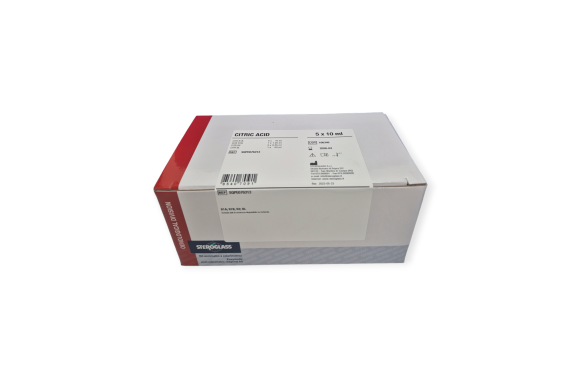Citric acid Kit
Contact our expert for more informations.

Tri-carboxylic organic acid present in grapes at concentrations varying between 0.3 - 0.6 g/l. It does not play a primary role in oenological science and its level generally remains constant in wine. It can be metabolised by bacteria, both lactic and acetic, resulting in the production of acetic acid. It is currently possible to add citric acid to wine, while complying with the regulations in force (maximum limit 1 g/l), given its complexing action against ferric iron, preventing any ferric precipitation following aeration. Furthermore, this acid, with its acidifying action (0.93 g/l citric acid increases the titratable acidity by 1%), improves colour and brings freshness to the product.
Technical features
ADVANTAGES
READY TO USE: Liquid and easy to use.
PRECISION AND SPECIFICITY: Characterized by high specificity, they provide accurate and repeatable data.
LOW COSTS AND LONG SHELF LIFE: Minimal cost per test and a long shelf life (average 24 months).
FAST ANALYSIS: Allow for quick and reliable results (up to 300 tests/hour), especially when used with automated instruments like our HYPERLAB series analyzers.
SIMPLE AND ECONOMIC CALIBRATION: It is possible to use single-method and/or multi-parametric calibration/verification standards. The determination of the Blank is performed automatically every 12 hours with the Hyperlab analyzers.
METHODS APPROVED BY INTERNATIONAL STANDARDS: Numerous enzymatic methods have been approved and validated by international organizations such as:
ISO (International Standardization Organization)
AOAC (American Association of Analytical Chemists)
IFU (International Federation of Fruit Juice Producers)
OIV (International Wine Office)
IDF (International Dairy Federation)
EBC (European Brewery Convention) and many others.
STERGLASS ENZYMATIC AND COLORIMETRIC KITS
Enzymatic and colorimetric kits are widely used in quality control for the main analytical determinations of a variety of food products such as fruit juices, wine, beer, dairy products, eggs, meat, and for the monitoring of fermentation processes carried out by microorganisms for the determination of sugars, organic acids, and other components such as sulfites, phenolic compounds, and metals.
Based on high-quality purified enzymes, enzymatic analysis allows for precise, highly accurate, and repeatable measurements, even in complex matrices. The absorbance variation, measured spectrophotometrically as a result of enzymatic transformations, is closely correlated with the concentration of the various analytes sought.
Industries
Applications
Product codes
| Steroglass code | Description | N° analyses |
|---|---|---|
| SQPE076313 | Acid citric kit 5x10ml | manual 25/50; automatic 100/150 |
